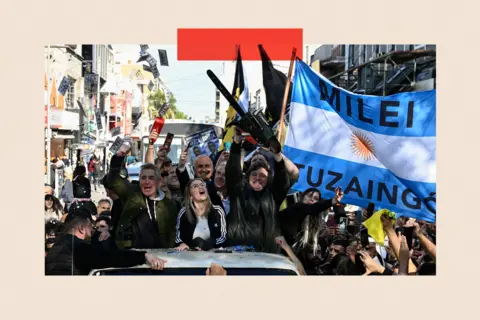Argentina's Thatcherite Experiment
Buenos Aires, September 2023. Hundreds of people crowded around to wave flags and film on their phones. The man with unruly hair and sideburns at the center of them, clad in a black leather jacket, hoisted a roaring chainsaw above his head.
This was an election rally in the San Martín area of Argentina's capital, just a month before the presidential election. Javier Milei, the candidate, declared that he would cut down unnecessary government ministries, subsidies, and the political class he called la casta – the caste.
His economic vision aligns with hardline market principles, taking cues from figures like Margaret Thatcher. With inflation reaching an eye-popping 211% in 2023 and about 40% of the population living in poverty, Milei proposed a brutal fiscal shock therapy as a means to restore order.

Since taking office, Argentina has seen its first fiscal surplus in 14 years, and inflation has fallen to approximately 36%. Figures like UK Conservative leader Kemi Badenoch hailed his policies as a template for future governance. However, Milei's stardom extends beyond borders; US President Donald Trump referred to him as my favorite president, and the two are set to meet in Washington soon.
The connection between Milei's aggressive reforms and the economic reality has polarized the nation. Protests have erupted as his measures have resulted in cuts to public service funding, leading critics to argue the working class bears the heaviest cost of these adjustments, while the privileged elite escape untouched.
Mercedes D'Alessandro, a left-wing economist and senate candidate, commented, He said in his campaign that this adjustment would be paid for by 'la casta' – the wealthy, the politicians, the evil businessmen. But, the adjustment in the end was directed at the working classes, not the caste.
Many Argentines report declining living conditions as factories shutter and job losses mount, with Milei's policies driving home a stark truth: amidst claims of success in taming hyperinflation, ordinary citizens are still sinking under the weight of soaring utility prices and diminished public services.
As the country gears up for midterm elections in late October, questions loom regarding Milei's political capital. Will voters punish him for the drastic measures he adopted and potentially unravel the small economic gains made during his presidency?
Cost of Living Crisis
Ygor Sobol, a tea farmer from Misiones province, reflects the struggles of many. Facing a loss of workers and plummeting crop values due to deregulation, Sobol lamented, We're all going backwards economically. I had to close the payroll. Now I am completely without employees.\
Meanwhile, criticisms are mounting regarding Milei's true impact on a national level. Though some fiscal indicators have shown improvement, rising unemployment and reduced disposable income raise concerns about the long-term sustainability of his policies.
In this polarizing political landscape, opinions on Milei's leadership and its implications for the future of Argentina remain deeply divided. While supporters view him as a crucial reformist, detractors are alarmed at the social fabric that is fraying as cuts to social programs and public services take hold.




















